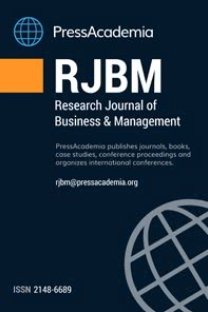TS EN 15224 HEALTHCARE SERVICE - THE COMPARISON OF QUALITY MANAGEMENT SYSTEM TO OTHER QUALITY SYSTEMS IN HEALTHCARE
Quality management systems, ISO 15224:2012, healthcare services quality assurance, ISO standards,
___
- Akyurt N. 2013, “Hastane Yönetimi” , Nobel Tıp Kitapevleri, 1. Baskı, pp. 453-460.
- Çakır A. , 2007 , “Hasta Güvenlığ̇ ı ̇Kültürü ile Kalıṫ e Yönetıṁ Sıṡ temı ̇Arasindaki İlış̇ kıṅ ıṅ Analıż ı ̇Tezi”, Dokuz Eylül Üniversitesi.
- Domittner B., 2013,”Quality Management”. Yazgan M., 2009, “Sağlık İşletmelerinde, Hizmet Kalitesinin Sağlık Hizmeti Sunan ve Sağlık Hizmeti Alan Taraflarca Değerlendirilmesi Tezi”, Dokuz Eylül Üniversitesi.
- Rad A., 2005, “A Survey of total quality management in IRAN”, Leadersh Heal Serv [Internet] ,18(3):5–7. www.emeraldsight.com/13660756.htm
- Sosyal Güvenlik Kurumu , 2013, “Sosyal Güvenlik Kurumu Sağlık Uygulama Tebliği”.
- Taşçı D., Eroğlu E., Çabuk S., Duman G, Ağlargöz O. Erdemir E. , 2013, “KALİTE YÖNETİM SİSTEMLERİ”, Anadolu Üniversitesi, pp 20
- Uluslararası Hasta Hizmetleri Derneği, 2016, “JCI Akredite Hastaneleri” [Internet]. [cited 2016 Nov 2]. http://www.visitturkeyforhealthcare.com/19-jci-akredite-hastaneleri.html
- Budak M, 2014, “Akreditasyon Ders Notları”, Okan Üniversitesi
- Weinmar C, Daniel M. ,2013, “Neuer Standard im Gesundheitswesen”. Praxis (Bern 1994) [Internet]., 36–7. http://www.bzbonline.de/jan13/36_37.pdf
- Sens B. , 2013, ”DIN EN 15224:2012 – eine neue Zertifizierungsnorm für Qualitätsmanagement- systeme in Gesundheitseinrichtungen : DIN EN 15224:2012 – a new certification standard for Quality Management Systems in healthcare facilities” , Clinotel 11.
- TS EN 15224 TÜRK STANDARDI ,2013
- Sağlık Bakanlığı, 2012, “SKS Işığında Sağlıkta Kalite”, 1. Baskı, Pozitif Matbaa.
- Tutuncu O. , “Evaluating the Effects of Quality Assurance: A Comparative analysis between ISO 9001 certified and Non - certified Hospitals in Turkey” .
- EU, 2013, “Comparative analysis of training needs and specific trends in healthcare quality assurance in. Life Long Learn Progr.”, 1–44.
- Pasachen U. , 2013, “Die DIN EN 15224:2012 - der neue Stamdard für QM - Systeme in Organisation der Gesundheits- versogung und die Konformitatsbewertung” Clinotel [Internet] 12:1–13. http://www.clinotel-journal.de/article-id-012.html Engel N., 2013, “DIN EN 15224 – Vorsicht ist angebracht!” Praxis.
- Øvretveit J. A , 1997, “Comparison of hospital quality programmes: lessons for other services”, Int J Serv Ind Manag, Vol;8(3):220–35.
- Øvretveit J, Serouri A Al., 2006, “Hospital quality management system in a low income Arabic country: an evaluation”, Int J Health Care Qual Assur 19(6):516–32.
- Øvretveit J. ,2003 , “What are the best strategies for ensuring quality in hospitals ?”, Health Evidence Network. Paccioni A, Sicotte C, Champagne F. , 2008 , “Accreditation: A cultural control strategy. Int J Health Care Qual Assur” 21(2):146 http://www.scopus.com/
- Sack C, Scherag A, Lütkes P, Günther W, Jöckel KH, Holtmann G. ,2011, “Is there an association between hospital accreditation and patient satisfaction with hospital care? A survey of 37 000 patients treated by 73 hospitals.”, Int J Qual Heal Care, 23(3):278–83.
- Serkan T.,2015, “Standart Belge ile Farklılaşma mümkün mü ? Akreditasyon Söylem Analizi.”, İstanbul Ticaret Üniversitesi Sos Bilim Dergi 27(Bahar).
- Yayın Aralığı: Yılda 4 Sayı
- Başlangıç: 2014
- Yayıncı: PressAcademia
Nabiallah EBRAHİMİ, E. Serra YURTKORU
K.A.Apeksha Nirmali, Mohd Shukri Ab Yajid, Ali Khatibi, S. M. Ferdous Azam, S.R.Sepalika Sudasinghe
Abdullah Alshboul, Yaoming Pei, Shwkar Abousweilem
Ferda ALPER AY, Gulbahtiyar DEMİREL, Nuriye ERBAS
Semih SORAN, Harun SESEN, Ebru CAYMAZ
